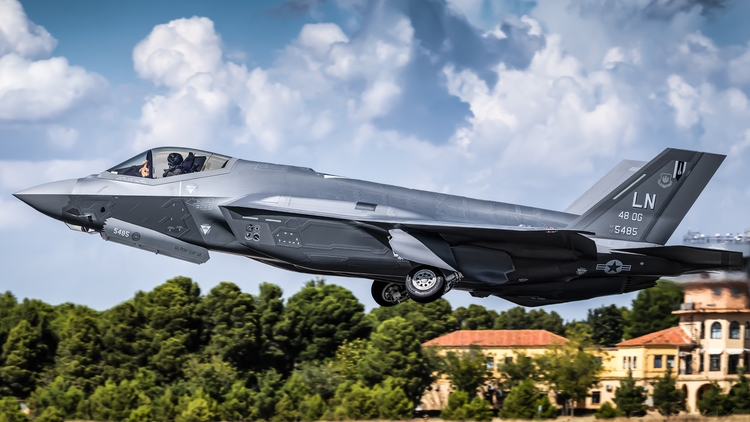Ángel Collado
Electoral or populist in terms of national policy, but compliant with NATO, the State Budget for 2023 is the first serious step towards improving Spain’s investment in defence since 2004. The prime minister is taking another turn, this time an Atlanticist one, which separates him from his extreme left-wing partners in power, and is investing in his foreign projection for the last year of the legislature.
In the budget for the Ministry of Defence, it even leaves room for the direct acquisition of US weapons systems such as the latest generation of fighter jets, an unprecedented move since 1983.
In the state accounts for next year there is money, in theory, for almost everything: from pension increases of 8.5 per cent to salary increases for ministers and their president of 4 per cent, over and above those of civil servants. But in proportion, the item that grows the most is defence, which will increase from 9,791 million euros this year to 12,317 million euros by 2023, a 25.8 per cent increase.
Sánchez has taken seriously the goal of Spain reaching 2 per cent of its Gross Domestic Product in defence investment by 2029, a commitment originally made by all NATO countries in 2014 (in the time of Barack Obama) that he ignored until he hosted the Atlantic Alliance summit in Madrid in June this year, with Joe Biden as the main guest.
The accumulated delay, the war in Ukraine and the effort to get closer to the US president explain the change. When the head of the executive came to power, he found himself with an investment in this area of barely 0.93 per cent of GDP, and it remains at 1.01 per cent this year, despite the fact that the left-wing coalition government has increased general state spending: from 503 billion euros in 2018 to 609.776 billion this year. Despite this leap, the percentage allocated to Defence had not increased until now.
Margarita Robles, head of the department and from the pro-Sanchez sector of the cabinet (she does not belong to the PSOE either), assures that with the 25.8 per cent increase in the amount allocated to defence policy, Spain hopes to reach 1.2 per cent of Gross Domestic Product (GDP) in military spending by 2023. This will be a first step towards bringing its investment closer to that of NATO countries, an alliance in which Spain is the country with the second lowest investment in this area.
Robles boasts that the increase will allow the Armed Forces to maintain the operational capabilities currently available, acquire new weapons systems and replace those that are becoming obsolete. The section that has increased the most is the so-called special weapons modernisation programmes, which are 72 percent higher than budgeted in 2022 and amount to 4,905 million euros.
As usual, investments in equipment are aimed at acquiring frigates, submarines, armoured vehicles and aircraft that are manufactured or assembled wholly or partly in Spain. These are national products or form part of European projects such as the Eurofighter fighters (EF-2000). The novelty this year is the chapter corresponding to the replacement of the Navy’s vertical take-off aircraft and the Air Force’s F-18s. 90 million are budgeted for next year as an advance on a renewal programme totalling 6.5 billion, in principle needed to replace almost 50 fighters that are reaching the end of their useful life over the next six years.
The leading candidate and favourite model of all NATO armed forces, including Spain’s, to replace the ageing vertical-take-off Harriers is the F-35 of the US company Lockheed Martin. The same is true of the Spanish Air Force’s aspirations to replace the F-18 with fighters that can go where the European EF-2000s cannot. Until now, the problem has been the price of the F-35s, the most advanced aircraft in the world, which cost between 75 and 105 million euros per unit, depending on the different versions. And there is also the fact that buying them does not bring money, jobs or technological development to the European Union.
The Atlanticist turn and Sánchez’s own personal determination to strengthen relations with Biden are influencing the State Budget, even in the chapter on arms purchases. And the accounts also give more fuel to theories about the prime minister’s willingness to seek a future in international politics if he is out of the running in next year’s elections.







